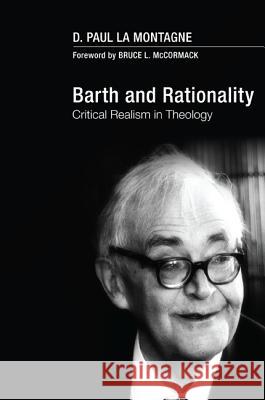Barth and Rationality » książka
Barth and Rationality
ISBN-13: 9781610976565 / Angielski / Miękka / 2012 / 248 str.
Barth and Rationality
ISBN-13: 9781610976565 / Angielski / Miękka / 2012 / 248 str.
(netto: 112,22 VAT: 5%)
Najniższa cena z 30 dni: 116,20
ok. 16-18 dni roboczych.
Darmowa dostawa!
Description: This work brings the critically realistic interpretation of Barth's dialectical theology into conversation with the modern dialogue between science and theology. Philosophy of science, philosophy of mathematics and logic, and considerations of the problem of rationality raised in the science and theology dialogue are brought to bear upon Barth's theology in an attempt to explicate the rationality of his dialectical method. Its deep and abiding radical nature and character are lifted up, emphasized, and explored. The results of this study are then used to answer some long-standing criticisms of Barth. What emerges are an understanding of how Barth uses philosophy and why he declines to do philosophy. La Montagne opens the way for Barth scholars to enter into the dialogue between theology and science. Endorsements: "With the publication of La Montagne's book, a new day has dawned in which Barth's 'post-Kantian' theological epistemology has to be taken seriously by those engaged in the theology and science debates . . . My gratitude to Paul La Montagne, for what I have learned from him is profound. I now eagerly look forward to seeing what others will do with the hard-earned results of his inquiry." -- Bruce L. McCormack, Charles Hodge Professor of Systematic Theology, Princeton Theological Seminary "This is a powerful and most welcome book. La Montagne brings his considerable scientific and mathematical background to bear on the study of Barth's theological epistemology. The result is a first-rate analysis that situates Barth in relation to critical realism in contemporary science and philosophy. There is much to be learned here about rationality in general and Barth in particular that would be difficult to find anywhere else." --George Hunsinger Hazel Thompson McCord Professor of Systematic Theology, Princeton Theological Seminary Editor of Torture Is a Moral Issue: Christians, Jews, Muslims, and People of Conscience Speak Out (2008) "Karl Barth is a towering intellect of the twentieth century. This groundbreaking book is further evidence that Barth is important to academic disciplines beyond theology. Paul La Montagne's work convinced me that Barth's theology is particularly relevant to the dialogue between theology and the natural sciences. His work helped me see significant similarities (and differences) between the epistemological issues raised by Barth's theology and by quantum physics and by the limits of reductionism." --Ross McKenzie Professor of Physics, University of Queensland, Brisbane, Australia About the Contributor(s): D. Paul La Montagne received the John Carlson award as the outstanding mathematics student at his graduation from Whitworth College before moving on to do a PhD in theology at Princeton Theological Seminary. He is the Stated Clerk of the Presbytery of New Brunswick and preaches and teaches as supply at Presbyterian and independent churches in central New Jersey.
Description:This work brings the critically realistic interpretation of Barths dialectical theology into conversation with the modern dialogue between science and theology. Philosophy of science, philosophy of mathematics and logic, and considerations of the problem of rationality raised in the science and theology dialogue are brought to bear upon Barths theology in an attempt to explicate the rationality of his dialectical method. Its deep and abiding radical nature and character are lifted up, emphasized, and explored. The results of this study are then used to answer some long-standing criticisms of Barth. What emerges are an understanding of how Barth uses philosophy and why he declines to do philosophy. La Montagne opens the way for Barth scholars to enter into the dialogue between theology and science.Endorsements:"With the publication of La Montagnes book, a new day has dawned in which Barths post-Kantian theological epistemology has to be taken seriously by those engaged in the theology and science debates . . . My gratitude to Paul La Montagne, for what I have learned from him is profound. I now eagerly look forward to seeing what others will do with the hard-earned results of his inquiry."-- Bruce L. McCormack, Charles Hodge Professor of Systematic Theology, Princeton Theological Seminary"This is a powerful and most welcome book. La Montagne brings his considerable scientific and mathematical background to bear on the study of Barths theological epistemology. The result is a first-rate analysis that situates Barth in relation to critical realism in contemporary science and philosophy. There is much to be learned here about rationality in general and Barth in particular that would be difficult to find anywhere else."--George HunsingerHazel Thompson McCord Professor of Systematic Theology, Princeton Theological SeminaryEditor of Torture Is a Moral Issue: Christians, Jews, Muslims, and People of Conscience Speak Out (2008)"Karl Barth is a towering intellect of the twentieth century. This groundbreaking book is further evidence that Barth is important to academic disciplines beyond theology. Paul La Montagnes work convinced me that Barths theology is particularly relevant to the dialogue between theology and the natural sciences. His work helped me see significant similarities (and differences) between the epistemological issues raised by Barths theology and by quantum physics and by the limits of reductionism."--Ross McKenzieProfessor of Physics, University of Queensland, Brisbane, AustraliaAbout the Contributor(s):D. Paul La Montagne received the John Carlson award as the outstanding mathematics student at his graduation from Whitworth College before moving on to do a PhD in theology at Princeton Theological Seminary. He is the Stated Clerk of the Presbytery of New Brunswick and preaches and teaches as supply at Presbyterian and independent churches in central New Jersey.











